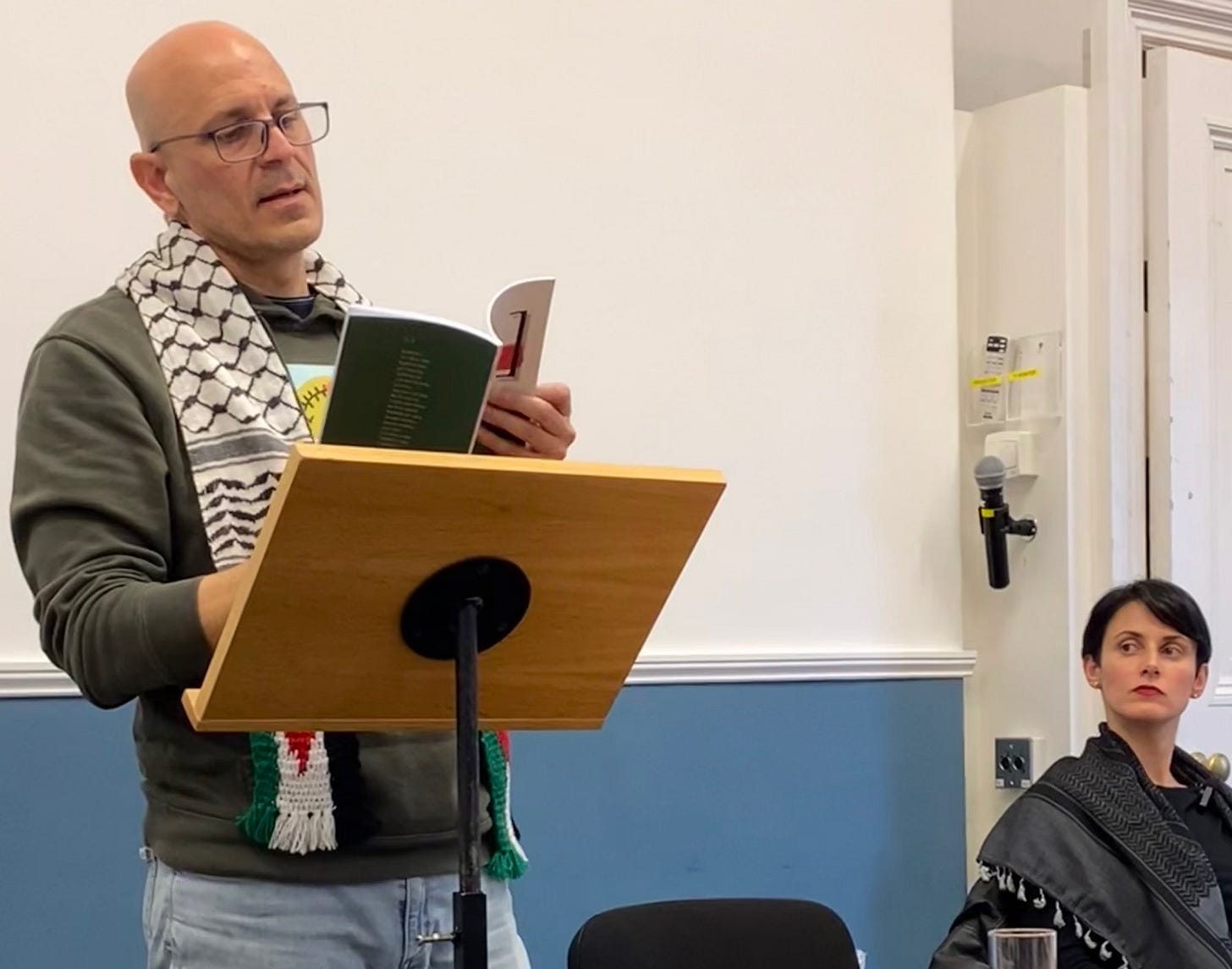Not speaking the same language
Or, to put it another way, communicating without listening
I’m Catholic and, today, Sunday 8 June, 2025, it’s Pentecost Sunday, when the first reading at Masses is from the Acts of the Apostles (2 : 1-11) which details the first time the Apostles are filled with the Holy Spirit and are gifted with the ability to be understood by people from different nations, speaking different languages. The Apostles are speaking Galilean but the “devout men from every nation” hear them in their own language, wherever they are from.
How amazing this would be, to be able to communicate to everyone without needing to learn other languages. Although this really would be the demise of university language departments, not to mention French GCSE. But I’ve been thinking not only of different languages today but of different ideas and viewpoints. One reason I’m particularly thinking about this is a poetry reading and Q&A event I went to last Friday by Palestinian American writer and translator Fady Joudah, who read poems from his 2024 book […] published by OutSpoken Press.

Many of the poems share the book’s title, […] which is best explained by the writer on OutSpoken’s website:
“I wrote the bulk of this collection between October and December of 2023. I could not imagine a title for the book or for most of its poems in a time of extermination. The text of the poems already says enough. The text also betrays a necessary silence. And yet the silence in the book is the silence that the reader, listener, recipient should practice. In some moments I share this silence with them, and they with me. In many moments, however, the silence is solely their task. The ellipsis in brackets highlight the space in which a Palestinian speaks and others listen.”
Therefore, on Friday, during an audience Q&A, it was more than excruciating when one audience member tried to correct Fady Joudah on his comment that the West is largely ignoring a genocide taking place in our time ("…but how can this be the case when me and all of my friends...") and another wanted to hold him to account for the inaction of the Arab world (“…and what about…”).
I’m sure that both people, both white British, and many in the audience, would say the interjections were ‘well-meant’ and ‘not malicious’ - and I’m sure this is the case - but today I’m wondering if this is enough or is any kind of excuse for the words leaving their mouths. Is it enough to say we support a cause, and even to seemingly actively support a cause by attending events, donating to charities, marching, signing petitions, writing to our political representatives, making art in support - when we are nevertheless prepared to disagree, even gently, when someone, in this case a Palestinian, tells it like it is? Perhaps Jesus might say that what’s missing is the core message of the Gospels - love for our fellow humans. To love and respect someone is to be prepared to step back and listen - it might include the “task of silence” that Fady Joudah speaks about. But it’s clear that silence is hard for a culture used to doing all the talking.
Reading the Acts of the Apostles extract in my Catholic Truth Society Sunday Missal today I was taken with this introduction by the late Pope Francis:
Deep down, in their hearts, the disciples needed to be changed. Their story teaches us that even seeing the Risen Lord is not enough, unless we welcome him into our hearts.
So, is this saying that the “devout men from every nation” heard God’s message in their own language because their hearts were open to welcoming that message? “Harden not your hearts today, but listen to the voice of the Lord” reads the Gospel Acclamation on Ash Wednesday, the first day of Lent which precedes the season of Easter which ends today, Pentecost.
What a mishmash of ideas you’re reading, written by a practicing Catholic and featuring a book of poems by a non-practicing Muslim (he told us).
Listening is a skill that takes a lifetime to learn, I've realised. I’m certainly still learning. The reading was wonderful. It made me think and sometimes cry. I bought the book. I’ve included a poem below. It’s on the back of the book. Fady Joudah explained that it’s a poem in conversation with Refaat Alareer’s poem ‘If I Must Die’ - which went viral after the poet’s death and, as Joudah pointed out, was written *12 years* before Refaat Alareer was killed by an Israeli airstrike in December 2023. “You celebrated a dead Palestinian poet,” he commented on the poem’s virality.
TL;DR it’s a long time since I’ve written any kind of blog and I’m still assembling my thoughts. Peace be with you and thanks for reading.


![[...] by Fady Joudah Suddenly I / 'in a blaze' died. / Suddenly time / quit lingering. / Suddenly you / can't find my body, / can't bury / what you can't find. / My final poem, / I wrote years before / my hour arrived. / Suddenly my voice, / thought voiceless / because stateless, / gave voice / to a noisy world. / Suddenly 'a kite'. / Suddenly I. [...] by Fady Joudah Suddenly I / 'in a blaze' died. / Suddenly time / quit lingering. / Suddenly you / can't find my body, / can't bury / what you can't find. / My final poem, / I wrote years before / my hour arrived. / Suddenly my voice, / thought voiceless / because stateless, / gave voice / to a noisy world. / Suddenly 'a kite'. / Suddenly I.](https://substackcdn.com/image/fetch/$s_!lsIv!,w_1456,c_limit,f_auto,q_auto:good,fl_progressive:steep/https%3A%2F%2Fsubstack-post-media.s3.amazonaws.com%2Fpublic%2Fimages%2F7da48b45-704e-4936-b88a-a4eb04c64994_1512x2016.jpeg)